Monday, July 29, 2013
SAVING NIKOLA TESLA'S LABORATORY - SPECIAL REPORT VVH-TV NEWS
Labels:
100% Independent Australian News,
mikiverse,
mikiverse headline news,
Mikiverse Hip Hop,
Mikiverse Law,
Mikiverse Politics,
Mikiverse Science
NIKOLA TESLA AND THE ELECTRIC UNIVERSE
Labels:
100% Independent Australian News,
mikiverse,
mikiverse headline news,
Mikiverse Hip Hop,
Mikiverse Law,
Mikiverse Politics,
Mikiverse Science
SCIENTISTS DISCOVER WHAT’S KILLING THE BEES AND IT’S WORSE THAN YOU THOUGHT
 |
| Outlawing a type of insecticides is not a panacea. AP Photo/Ben Margot |
Scientists had struggled to find the trigger for so-called Colony Collapse Disorder (CCD) that has wiped out an estimated 10 million beehives, worth $2 billion, over the past six years. Suspects have included pesticides, disease-bearing parasites and poor nutrition. But in a first-of-its-kind study published today in the journal PLOS ONE, scientists at the University of Maryland and the US Department of Agriculture have identified a witch’s brew of pesticides and fungicides contaminating pollen that bees collect to feed their hives. The findings break new ground on why large numbers of bees are dying though they do not identify the specific cause of CCD, where an entire beehive dies at once.
When researchers collected pollen from hives on the east coast pollinating cranberry, watermelon and other crops and fed it to healthy bees, those bees showed a significant decline in their ability to resist infection by a parasite called Nosema ceranae. The parasite has been implicated in Colony Collapse Disorder though scientists took pains to point out that their findings do not directly link the pesticides to CCD. The pollen was contaminated on average with nine different pesticides and fungicides though scientists discovered 21 agricultural chemicals in one sample. Scientists identified eight ag chemicals associated with increased risk of infection by the parasite.
Most disturbing, bees that ate pollen contaminated with fungicides were three times as likely to be infected by the parasite. Widely used, fungicides had been thought to be harmless for bees as they’re designed to kill fungus, not insects, on crops like apples.
“There’s growing evidence that fungicides may be affecting the bees on their own and I think what it highlights is a need to reassess how we label these agricultural chemicals,” Dennis vanEngelsdorp, the study’s lead author, told Quartz.
Labels on pesticides warn farmers not to spray when pollinating bees are in the vicinity but such precautions have not applied to fungicides.
Bee populations are so low in the US that it now takes 60% of the country’s surviving colonies just to pollinate one California crop, almonds. And that’s not just a west coast problem—California supplies 80% of the world’s almonds, a market worth $4 billion.
In recent years, a class of chemicals called neonicotinoids has been linked to bee deaths and in April regulators banned the use of the pesticide for two years in Europe where bee populations have also plummeted. But vanEngelsdorp, an assistant research scientist at the University of Maryland, says the new study shows that the interaction of multiple pesticides is affecting bee health.
“The pesticide issue in itself is much more complex than we have led to be believe,” he says. “It’s a lot more complicated than just one product, which means of course the solution does not lie in just banning one class of product.”
The study found another complication in efforts to save the bees: US honey bees, which are descendants of European bees, do not bring home pollen from native North American crops but collect bee chow from nearby weeds and wildflowers. That pollen, however, was also contaminated with pesticides even though those plants were not the target of spraying.
“It’s not clear whether the pesticides are drifting over to those plants but we need take a new look at agricultural spraying practices,” says vanEngelsdorp.
ETHICAL DONATORS AND COMMUNITY MEMBERS REQUIRED, TO FILL THIS
SPACE WITH YOUR POLITICAL SLOGANS, ADVERTISING OFFERS,WEBSITE DETAILS, CHARITY REQUESTS, LECTURE OPPORTUNITIES, EDUCATIONAL WORKSHOPS, SPIRITUAL
AND/OR HEALTH ENLIGHTENMENT COURSES.
AS AN IMPORTANT MEMBER OF THE
GLOBAL INDEPENDENT
MEDIA COMMUNITY, MIKIVERSE SCIENCE HONOURABLY REQUESTS YOUR HELP TO
KEEP YOUR NEWS, DIVERSE,
AND FREE OF CORPORATE, GOVERNMENT SPIN AND
CONTROL. FOR MORE INFORMATION ON HOW YOU MAY ASSIST, PLEASE CONTACT:
themikiverse@gmail.comhttp://qz.com/107970/scientists-discover-whats-killing-the-bees-and-its-worse-than-you-thought/
Labels:
100% Independent Australian News,
mikiverse,
mikiverse headline news,
Mikiverse Hip Hop,
Mikiverse Law,
Mikiverse Politics,
Mikiverse Science
Wednesday, July 24, 2013
DLE-TEST25 : REGENERATIVE LOADING WITH THE J. BEDINI'S UNIPOLAR MOTOR PILOTED BY THE APMC V1.B
created on february 9, 2013 - JLN
Labs - last update april 29, 2013
All informations and diagrams are published freely (freeware) and are intended for a private use and a non commercial use.
Toutes les informations et schémas sont publiés gratuitement ( freeware ) et sont destinés à un usage personnel et non commercial
Cliquez ici pour la version FRANCAISE
April 29, 2013 - DLE-TEST25 : Here is a test of the unipolar (North pole) motor invented by John Bedini and piloted by the APMC (Arduino Pulsed Motor Controller) v1.0b. A LED Spot of 24 Leds (1.6W/12V) is only powered by the Back EMF pulses from the motor coil. A PC computer is connected via the USB port of the Arduino Mega 2560 board, the telemetry datas (time base, RPM, pulses delay and pulses duration, user datas and computed datas...) are displayed on the computer and also on the LCD screen of the APMC. When the motor is loaded the input power drops dramatically and the RPM speed is doubled.
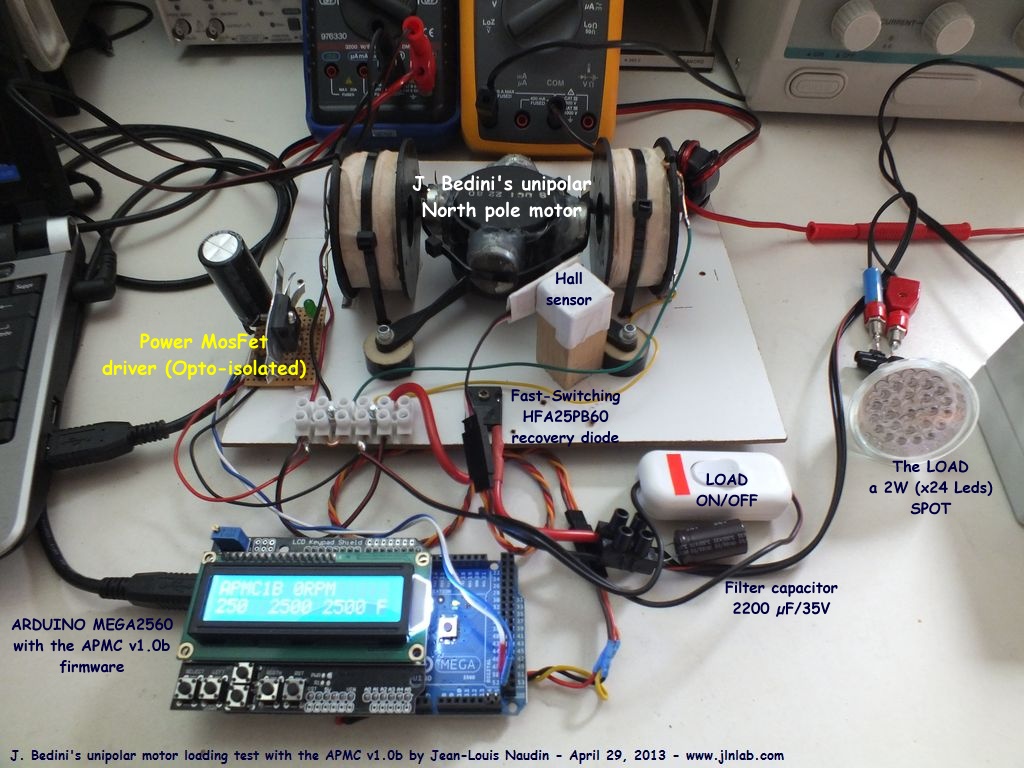
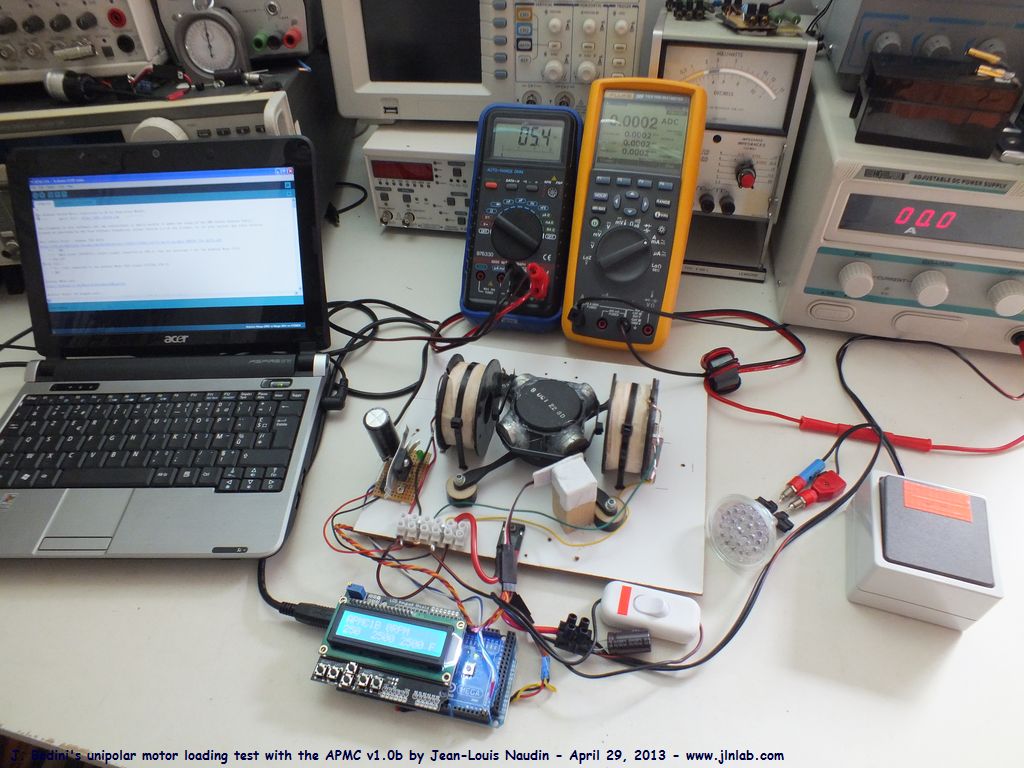

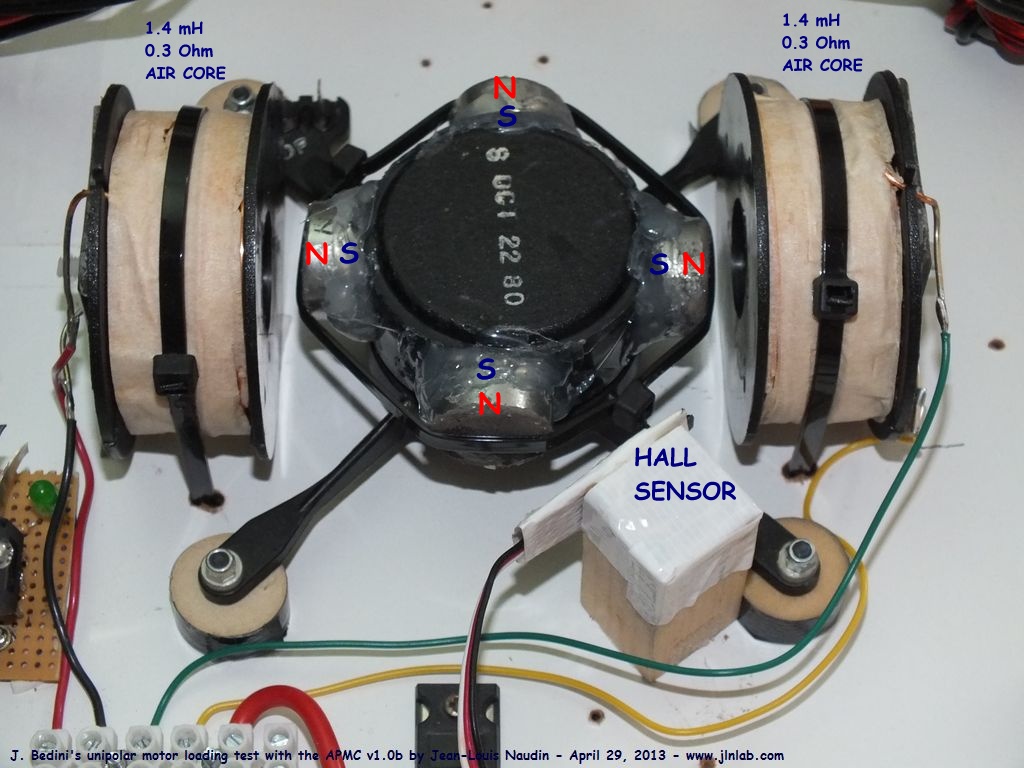
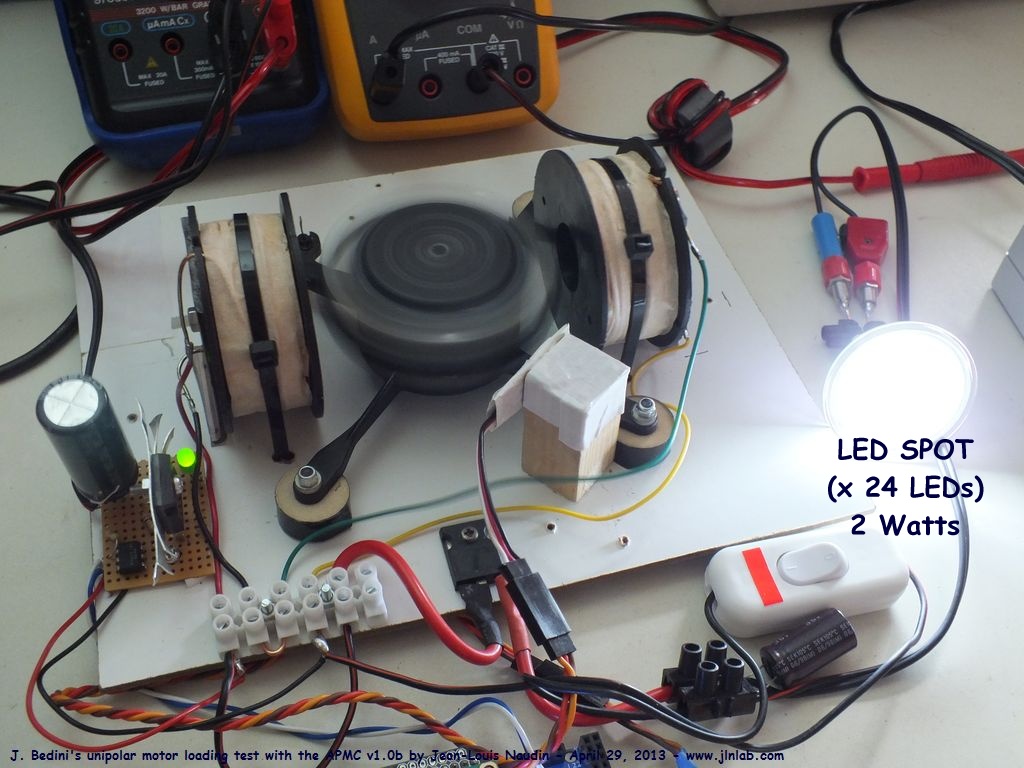
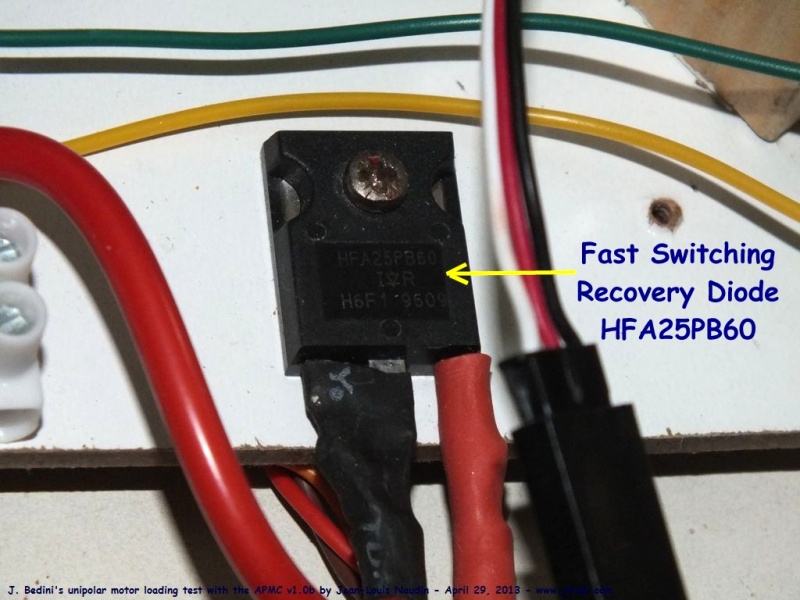
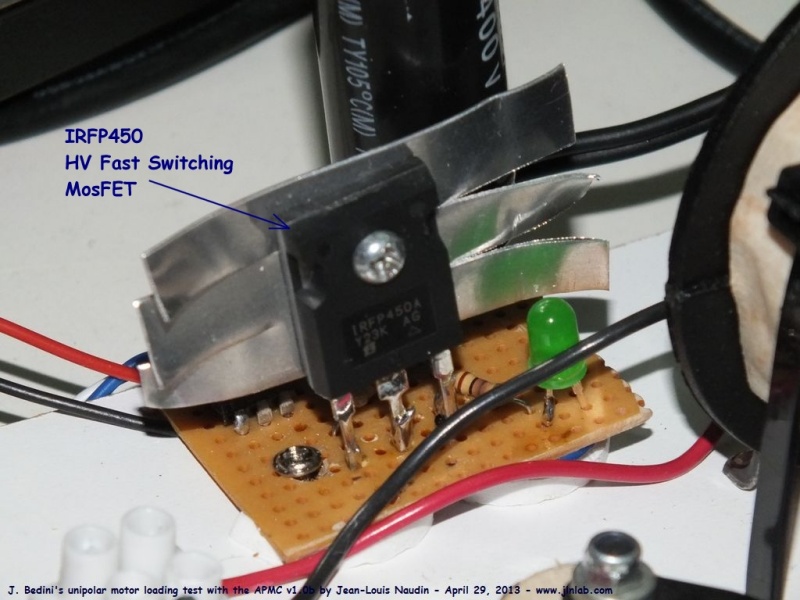
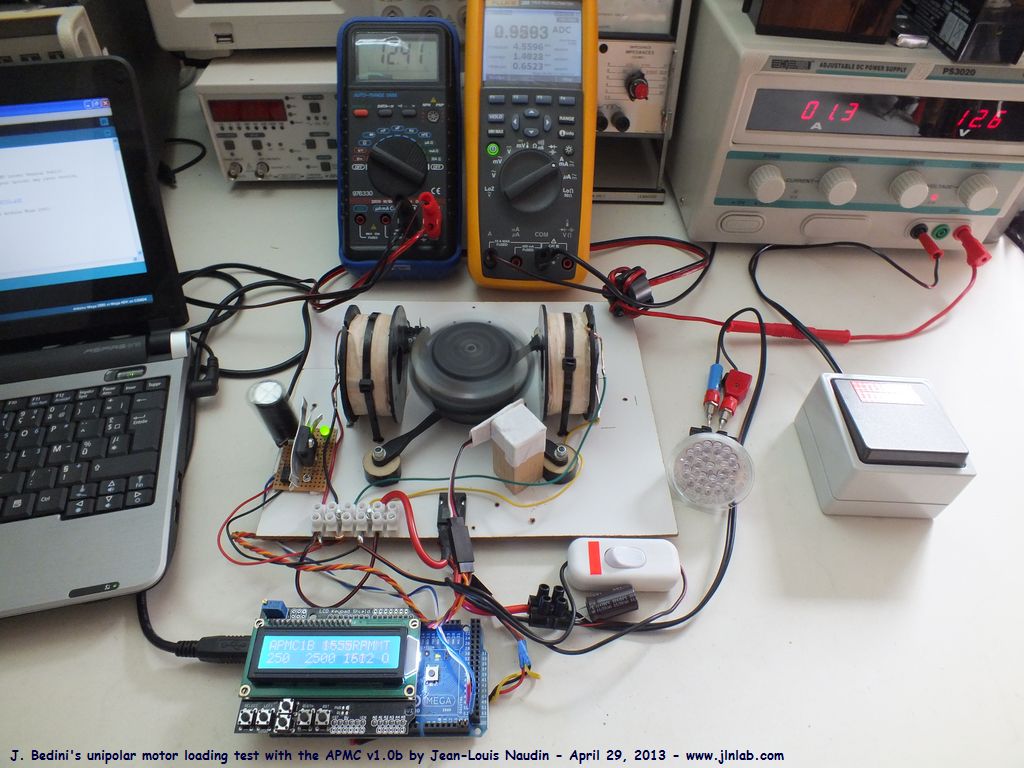
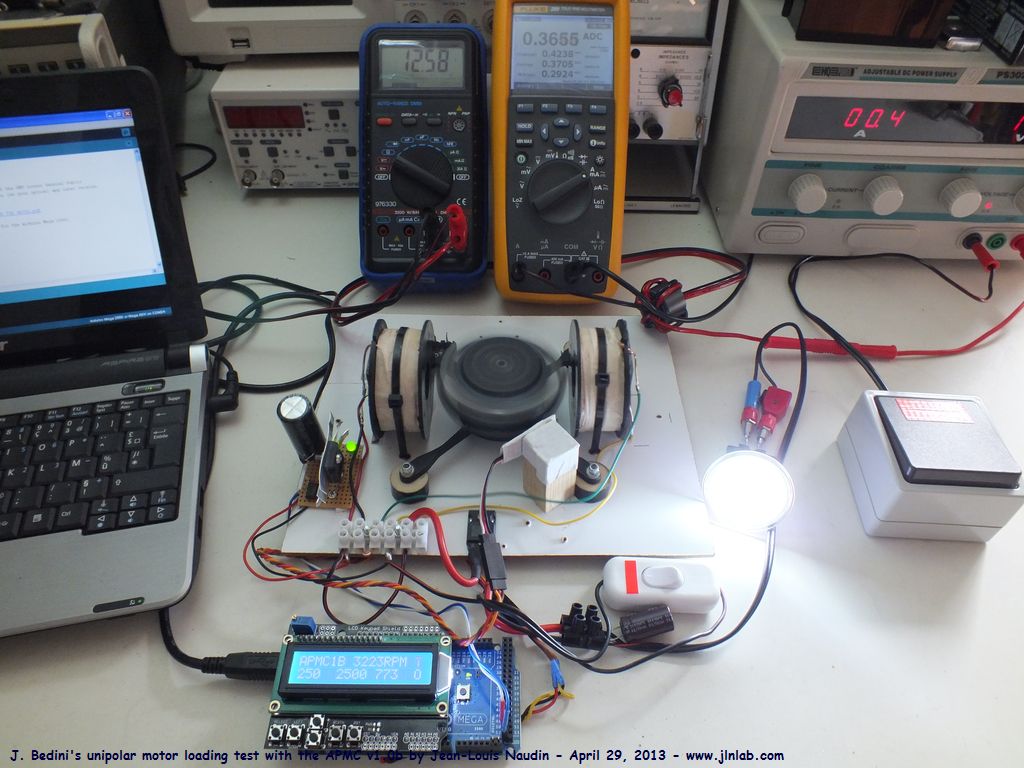
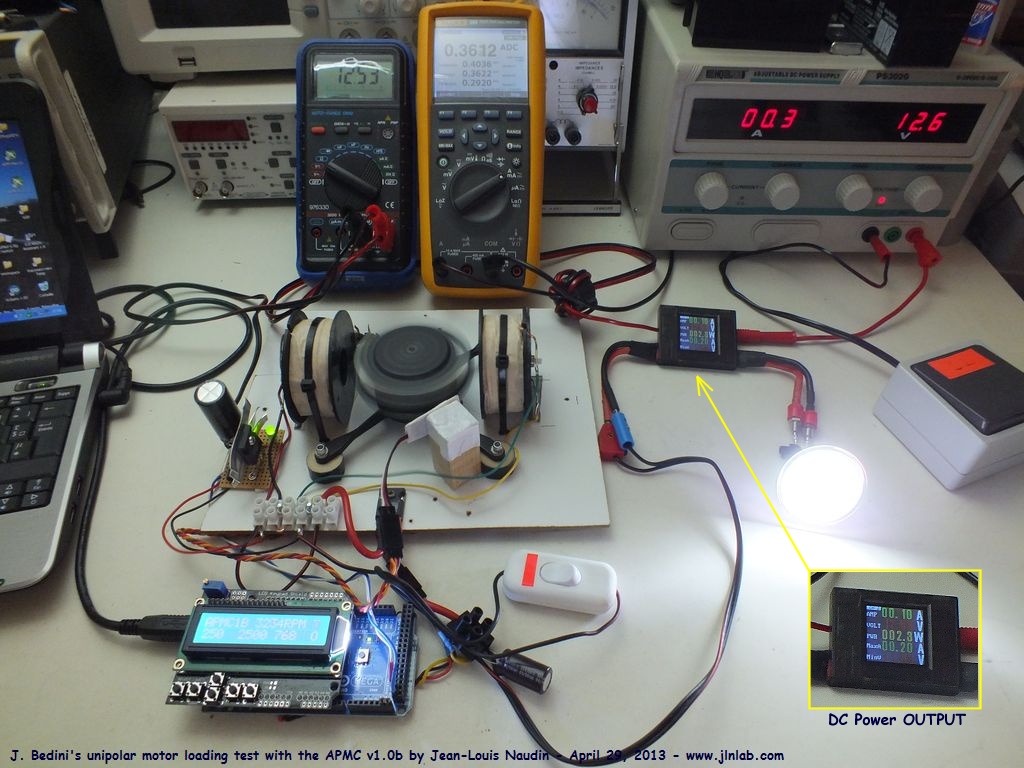
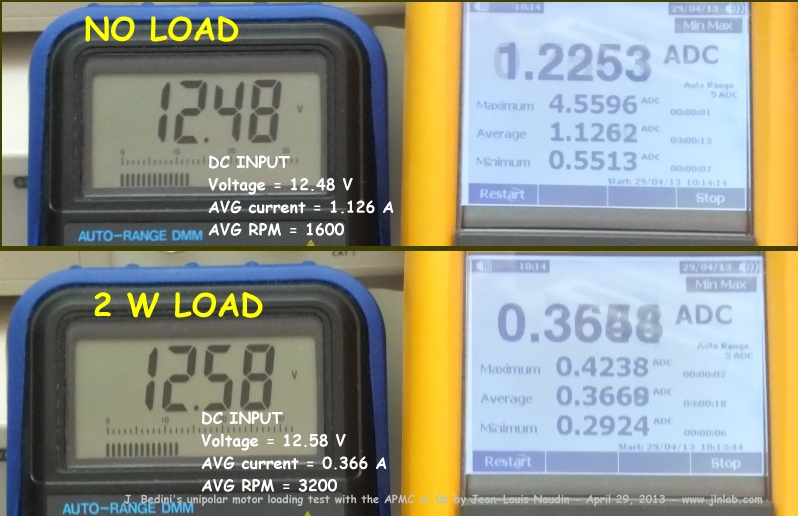
All informations and diagrams are published freely (freeware) and are intended for a private use and a non commercial use.
Toutes les informations et schémas sont publiés gratuitement ( freeware ) et sont destinés à un usage personnel et non commercial
Cliquez ici pour la version FRANCAISE
April 29, 2013 - DLE-TEST25 : Here is a test of the unipolar (North pole) motor invented by John Bedini and piloted by the APMC (Arduino Pulsed Motor Controller) v1.0b. A LED Spot of 24 Leds (1.6W/12V) is only powered by the Back EMF pulses from the motor coil. A PC computer is connected via the USB port of the Arduino Mega 2560 board, the telemetry datas (time base, RPM, pulses delay and pulses duration, user datas and computed datas...) are displayed on the computer and also on the LCD screen of the APMC. When the motor is loaded the input power drops dramatically and the RPM speed is doubled.
Here
is the configuration of the test :


Below
the detailled diagram of the APMC and its control board :

Below
a detailled photo of the Bedini's unipolar motor.


A
double fast switching HFA25PB60 diode and a filtering capacitor
is connected the load.

A
High Power and High Voltage fast-switching IRFP450 MosFet transistor MosFet
rapide (Haute Tension) controlling the motor is coupled to the
Arduino Mega2560 micro-controller via a 4n25 optocoupler.

When
the LOAD IS CONNECTED the RPM speed is DOUBLED and the INPUT
POWER DROPS dramatically.
Below,
the motor running without load :

Below,
the motor running with a 2 W load at the output :

The
DC OUTPUT POWER flowing through the SPOT LED has been measured
and checked with a Wattmeter (below, it is 2.3 Watts) :

Here
are the measurements of the INPUT DC voltage and current with and
without the output load (the spot LED) :

he
firmware of the APMC v1.0b can be downloaded at : http://jlnlab-tools.googlecode.com/files/APMCv1b.zip
The
full source code is released in Open Source under GNU licence and
can be displayed at :
Technical
documents :- The Arduino MEGA 2560 microcontroller
- The LCD-Keypad for the Arduino board
- The HALL effect sensor TL4935L
- The High Power MosFet transistor IRFP450
- The optocoupler 4N25
- The fast switching diode HFA25PB60
Stay
tuned,
http://jnaudin.free.fr/dlenz/DLE26en.htmEmail: jnaudin509@aol.com
ETHICAL DONATORS AND COMMUNITY MEMBERS REQUIRED, TO FILL THIS
SPACE WITH YOUR POLITICAL SLOGANS, ADVERTISING OFFERS,WEBSITE DETAILS, CHARITY REQUESTS, LECTURE OPPORTUNITIES, EDUCATIONAL WORKSHOPS, SPIRITUAL
AND/OR HEALTH ENLIGHTENMENT COURSES.
AS AN IMPORTANT MEMBER OF THE
GLOBAL INDEPENDENT
MEDIA COMMUNITY, MIKIVERSE SCIENCE HONOURABLY REQUESTS YOUR HELP TO
KEEP YOUR NEWS, DIVERSE,
AND FREE OF CORPORATE, GOVERNMENT SPIN AND
CONTROL. FOR MORE INFORMATION ON HOW YOU MAY ASSIST, PLEASE CONTACT:
themikiverse@gmail.com
Labels:
100% Independent Australian News,
mikiverse,
mikiverse headline news,
Mikiverse Hip Hop,
Mikiverse Law,
Mikiverse Politics,
Mikiverse Science
Subscribe to:
Comments (Atom)
